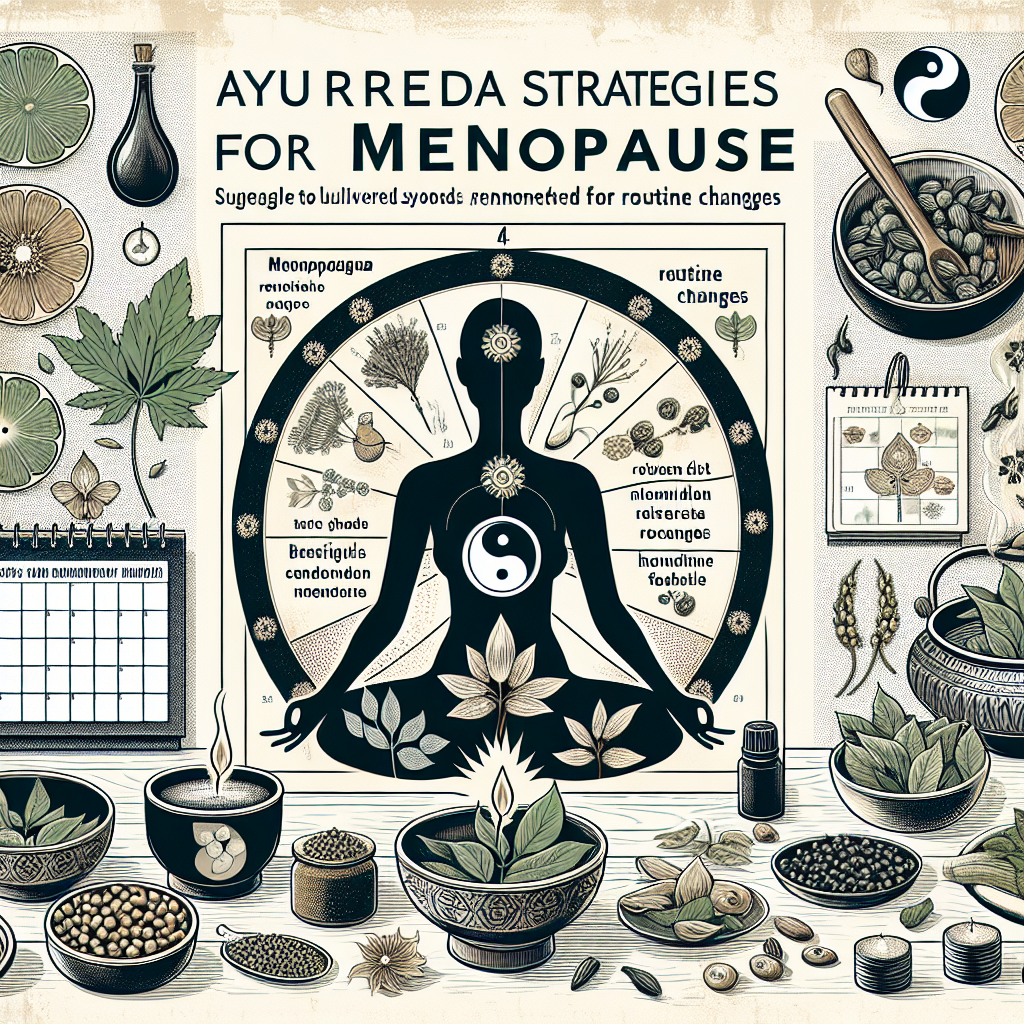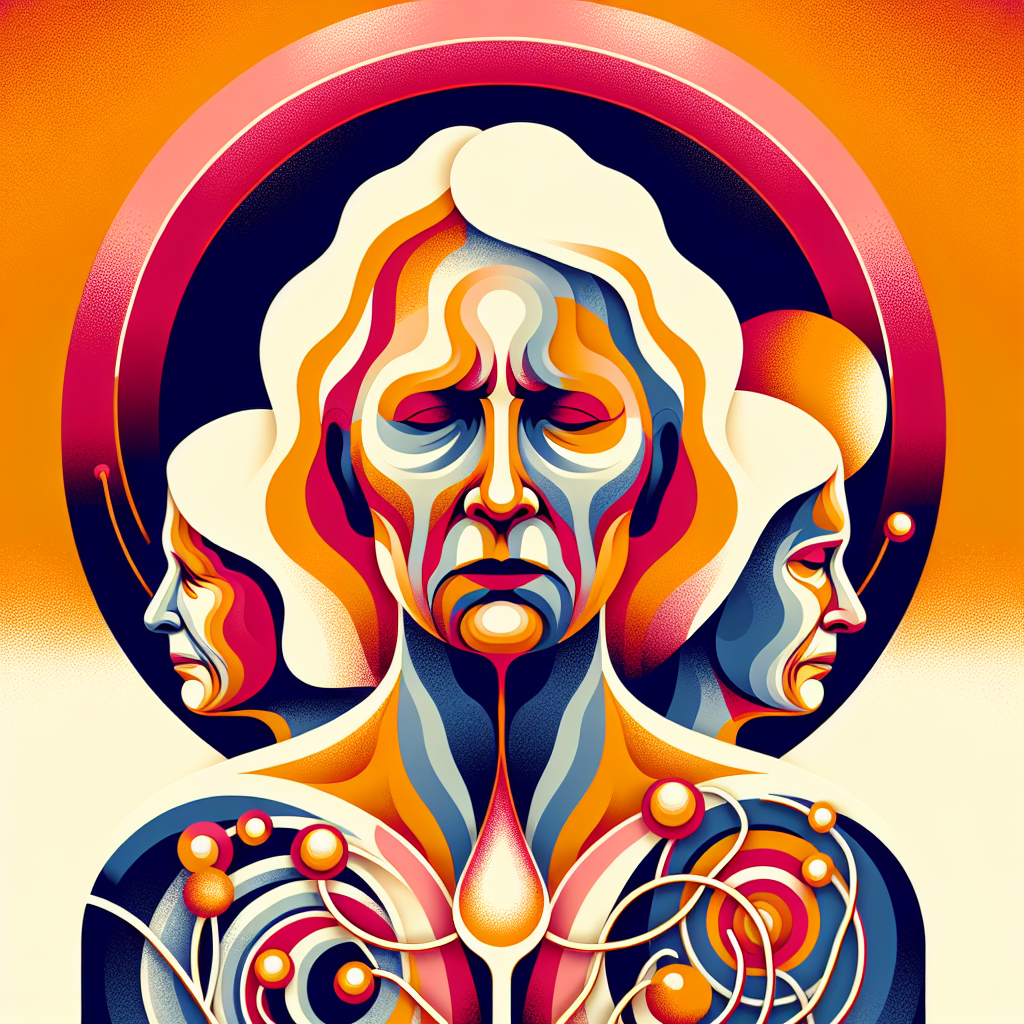
Navigating the Challenges of Menopause
Navigate the challenges of menopause with the ancient wisdom of Ayurvedic medicine! Discover holistic approaches to balance your body and mind through dietary adjustments, herbal allies, and daily routines.
Embrace this transformative time with grace and insight, and turn hot flashes into an opportunity for personal growth.
Finding Balance Naturally: Ayurvedic Medicine for Menopause Symptoms
Hot flashes hitting you like a surprise sauna session? Night sweats turning your bed into a small ocean? Welcome to the wild ride of menopause! While this natural transition comes with its fair share of challenges, there's an ancient wisdom that might just be your new best friend: Ayurvedic medicine for menopause symptoms.
As a 5,000-year-old healing system from India, Ayurveda offers a holistic approach to managing menopause that treats you as a whole person—not just a collection of symptoms. Let's dive into how this time-tested tradition can help you navigate the change with grace, humor, and hopefully fewer wardrobe changes due to unexpected personal heatwaves!
Understanding Menopause Through Ayurvedic Eyes
Before we jump into remedies, let's understand how Ayurveda views menopause. Unlike Western medicine, which often focuses primarily on hormone replacement, Ayurvedic medicine for menopause symptoms takes a different approach.
According to Ayurveda, menopause is a natural transition where vata dosha (the energy of movement) becomes more prominent. Dr. Claudia Welch, author of "Balance Your Hormones, Balance Your Life," explains that "from an Ayurvedic perspective, menopause is a time when women transition from the pitta (fire) phase of life to the vata (air/space) phase."
This vata increase can manifest as:
- Dryness (skin, vaginal tissues)
- Anxiety or restlessness
- Sleep disturbances
- Mood fluctuations
- Memory issues
Meanwhile, there can also be temporary pitta (fire) imbalances causing:
- Hot flashes
- Night sweats
- Irritability
- Inflammation
Understanding these patterns helps explain why Ayurvedic medicine for menopause symptoms focuses on balancing these energies rather than simply replacing hormones.
The Ayurvedic Approach to Menopause Management
1. Dietary Adjustments: Food as Medicine
Ayurvedic medicine for menopause symptoms begins with what's on your plate. The foods you eat can either calm or aggravate your symptoms.
Vata-Balancing Foods:
- Warm, cooked meals (think soups and stews)
- Healthy oils like ghee and olive oil
- Sweet, sour, and salty tastes
- Warming spices like ginger, cinnamon, and cardamom
Foods to Reduce:
- Caffeine and alcohol (sorry, but they can trigger hot flashes!)
- Spicy foods (they increase internal heat)
- Cold, raw foods (they can increase vata)
- Processed foods and refined sugars
A study published in the Journal of Ayurveda and Integrative Medicine found that women who adopted an Ayurvedic diet reported a 33% reduction in hot flashes within three months. Now that's something to celebrate with a cup of cooling rose tea!
2. Herbal Allies: Nature's Support System
Ayurvedic medicine for menopause symptoms offers a treasure trove of herbs that have been supporting women for centuries. These aren't just old wives' tales—many have scientific research backing their effectiveness.
Shatavari (Asparagus racemosus): Often called the "Queen of Herbs" in Ayurveda, this adaptogenic plant helps balance hormones and reduce hot flashes. Research published in the Journal of Ethnopharmacology confirms its phytoestrogenic properties.
Ashwagandha (Withania somnifera): This powerful adaptogen helps your body manage stress—a major trigger for menopause symptoms. A 2019 study in the Journal of Alternative and Complementary Medicine found that ashwagandha significantly reduced cortisol levels and improved sleep quality in menopausal women.
Triphala: This three-fruit combination supports digestion and elimination, which often become sluggish during menopause. Better digestion means better hormone processing!
Licorice Root: Contains compounds that can help manage estrogen levels naturally. However, women with high blood pressure should use it cautiously.
Brahmi (Bacopa monnieri): Supports cognitive function and helps with the "menopause brain fog" that many women experience.
3. Daily Routines (Dinacharya): Creating Stability
When vata is increased during menopause, establishing regular routines becomes even more important. Ayurvedic medicine for menopause symptoms emphasizes the power of daily practices:
Morning Rituals:
- Wake up at the same time daily
- Practice gentle yoga or stretching
- Self-massage with warm sesame oil (abhyanga)
- Meditation or deep breathing for 10-15 minutes
Evening Wind-Down:
- Reduce screen time 1-2 hours before bed
- Drink warm milk with a pinch of nutmeg and cardamom
- Practice gentle stretching or restorative yoga
- Be in bed by 10 PM when possible
Dr. Ramkumar Kutty of Vaidyagrama Healing Village notes, "Consistency in daily routines is perhaps the single most important practice for balancing vata dosha during menopause."
Specific Ayurvedic Remedies for Common Menopause Symptoms
For Hot Flashes and Night Sweats
Hot flashes are perhaps the most notorious menopause symptom, affecting up to 80% of women. Ayurvedic medicine for menopause symptoms offers several cooling strategies:
Cooling Herbs:
- Shatavari powder (1/2 teaspoon) in milk before bed
- Fresh coriander juice (1 tablespoon) with a pinch of sugar
- Rose petal jam (gulkand) - 1 teaspoon twice daily
Cooling Practices:
- Moonlight bathing (sitting in moonlight for 10-15 minutes)
- Applying sandalwood paste to the forehead and chest
- Sitali pranayama (cooling breath technique)
A clinical trial published in the International Journal of Ayurveda Research found that a combination of shatavari and cooling herbs reduced hot flash frequency by 47% over six weeks compared to 29% in the placebo group.
For Mood Swings and Anxiety
The emotional rollercoaster of menopause can be challenging. Ayurvedic medicine for menopause symptoms addresses the mind-body connection:
Calming Herbs:
- Brahmi tea twice daily
- Ashwagandha (300-500mg) twice daily
- Jatamansi (Nardostachys jatamansi) as recommended by a practitioner
Balancing Practices:
- Shirodhara (warm oil poured over the forehead)
- Regular meditation practice
- Alternate nostril breathing (nadi shodhana)
Research in the Journal of Clinical and Diagnostic Research demonstrated that women practicing meditation and yoga alongside Ayurvedic herbs experienced a 62% improvement in anxiety symptoms compared to those using conventional treatments alone.
For Sleep Disturbances
When counting sheep turns into counting hot flashes, try these Ayurvedic approaches:
Sleep-Supporting Herbs:
- Nutmeg milk: Warm milk with a pinch of nutmeg
- Ashwagandha and Brahmi combination before bed
- Jatamansi tincture as directed by a practitioner
Sleep Rituals:
- Oil massage to the soles of feet before bed
- Gentle forward bends and supported inversions
- Creating a vata-calming bedroom (warm, cozy, minimal electronics)
For Vaginal Dryness and Discomfort
Ayurvedic medicine for menopause symptoms doesn't shy away from intimate concerns:
Internal Support:
- Shatavari ghee (1 teaspoon twice daily)
- Adequate hydration with warm or room temperature water
- Healthy fats in the diet (ghee, olive oil, avocados)
External Support:
- Organic coconut oil as a natural lubricant
- Shatavari and licorice root vaginal oil (consult a practitioner)
- Warm sitz baths with rose petals
Creating Your Personal Ayurvedic Menopause Plan
The beauty of Ayurvedic medicine for menopause symptoms lies in its personalization. No two women experience menopause exactly the same way, and Ayurveda honors this uniqueness.
Step 1: Determine Your Constitution (Prakriti)
Understanding your natural constitution helps tailor remedies specifically for you. While a full consultation with an Ayurvedic practitioner is ideal, you can get a general sense of your dominant doshas through online quizzes or books.
Step 2: Identify Your Current Imbalances (Vikriti)
Which symptoms are most troublesome for you? This helps determine which doshas need the most balancing.
Step 3: Start Simple
Begin with one or two Ayurvedic approaches rather than overhauling your entire lifestyle at once:
- Perhaps start with an evening routine and one herbal remedy
- Add dietary changes gradually
- Notice what works and what doesn't
Step 4: Seek Professional Guidance
While many Ayurvedic practices are safe for self-implementation, working with a qualified Ayurvedic practitioner can provide personalized guidance. This is especially important if you have existing health conditions or are taking medications.
Integrating Ayurveda with Modern Medicine
Ayurvedic medicine for menopause symptoms doesn't have to be an either/or choice with conventional treatments. Many women find success with an integrative approach.
Dr. Avanti Kumar-Singh, author of "The Health Catalyst," suggests, "The most effective approach to menopause often combines the wisdom of Ayurveda with the advances of modern medicine. Share your Ayurvedic practices with your physician and work together to create an optimal plan."
Some considerations for integration:
- Inform your doctor about any herbs you're taking
- Consider Ayurvedic approaches for symptom management alongside medical treatments
- Use Ayurveda's lifestyle wisdom even if you choose hormone replacement therapy
Embracing the Wisdom Years
Perhaps the most profound aspect of Ayurvedic medicine for menopause symptoms is its perspective on this life transition. Rather than viewing menopause as merely an end to fertility, Ayurveda sees it as the beginning of the wisdom years—a time when women can channel their energy inward for spiritual growth and self-discovery.
As Dr. Claudia Welch beautifully states, "In Ayurveda, menopause is considered a powerful opportunity for transformation—physically, emotionally, and spiritually."
Conclusion: Your Menopause, Your Journey
Ayurvedic medicine for menopause symptoms offers a comprehensive, natural approach to navigating this significant life transition. From dietary adjustments and herbal remedies to daily routines and mindfulness practices, this ancient system provides tools to address the full spectrum of menopause experiences.
Remember that the journey through menopause is unique for every woman. What works wonderfully for your friend might not be your perfect solution. Be patient with yourself as you explore Ayurvedic approaches, and celebrate the small victories along the way.
Whether you're just beginning to experience perimenopause symptoms or are well into your post-menopausal years, Ayurvedic medicine for menopause symptoms offers wisdom that has supported women for thousands of years. Perhaps it's time to let this ancient knowledge support your modern journey too.
After all, hot flashes may be temporary, but wisdom is forever!
















